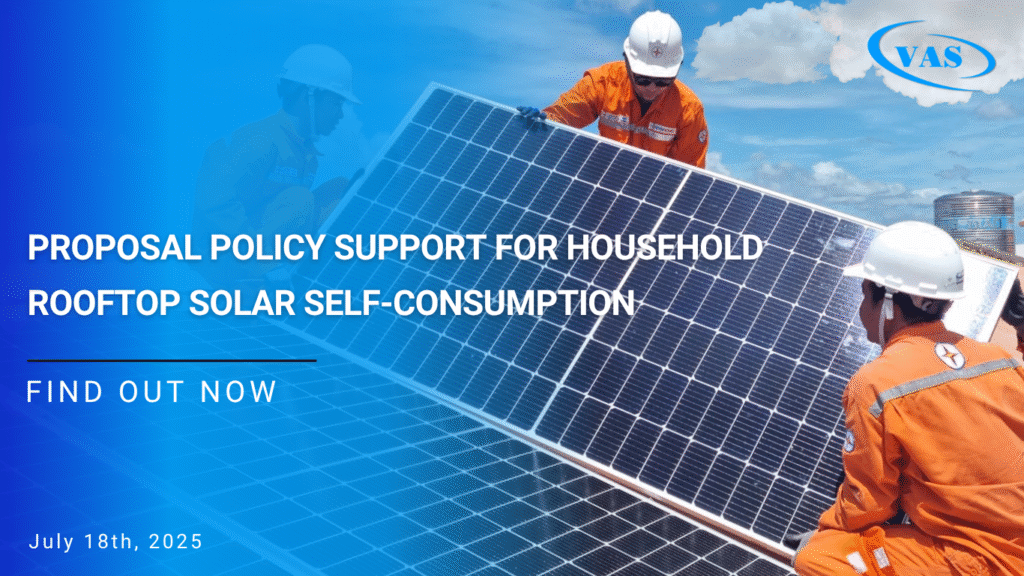The Ministry of Industry and Trade is drafting a Prime Minister’s Decision on policies to support households in installing rooftop solar power systems for self-production, self-consumption, and electricity storage systems.
Financial Support
- Household rooftop solar power systems will receive investment support at a maximum rate of VND 500,000 per 1 kWp of total installed capacity of photovoltaic (PV) panels in the system, but not exceeding VND 2,500,000 per household.
- Household rooftop solar systems are eligible for interest rate support on commercial loans for investment as follows:
They will be subject to the short-term loan interest rate in Vietnamese dong as regulated in Clause 2, Article 13 of Circular No. 39/2016/TT-NHNN dated December 30, 2016, issued by the State Bank of Vietnam, which provides guidelines on lending activities of credit institutions and foreign bank branches to customers.
The maximum duration of interest rate support is 3 years, starting from the date of the first disbursement of the loan under the credit agreement with the commercial bank.
The maximum loan amount eligible for interest rate support is VND 7 million per 1 kWp of total installed capacity of PV panels in the system, but not exceeding VND 35 million in total.
The draft clearly states that the funding sources for the financial support mentioned in Points 1 and 2 above shall be allocated from the local development investment budget. Each year, the provincial People’s Committee will submit the specific level of financial support to the Provincial People’s Council for consideration and decision, ensuring it aligns with the province’s budget capacity and investment demand for household rooftop solar systems in the area.
Technical Support
Household rooftop solar systems may receive technical support during the investment, installation, and operation process upon request by the homeowner, specifically as follows:
- The local electricity unit will provide guidance on technical requirements under electricity law, including: connection, control, monitoring, and protection; guidance on installation to ensure electrical safety.
The local electricity unit must provide this guidance within 5 working days from the date of receiving the homeowner’s request.
If the homeowner wants to sell excess electricity from the rooftop solar system to the grid, the local electricity unit must:
— Cooperate to install or replace the two-way electricity meter suitable for the connection capacity of the household’s rooftop solar system.
— Provide instructions on procedures and relevant regulations to sign a power purchase agreement for the excess electricity with the homeowner. - The commune-level People’s Committee will provide guidance on structural safety design and fire prevention and fighting solutions, in accordance with relevant laws and suitable to the family’s housing conditions.
Conditions for Financial Support
Household rooftop solar systems are eligible for the financial support mentioned in Point 1 above when meeting the following conditions:
- A written request for financial support must be sent to the commune-level People’s Committee where the system is installed.
- The system must have completed all procedures for development, investment, installation, connection, acceptance testing, and operation, in accordance with relevant regulations stated in Chapter III of Decree No. 58/2025/NĐ-CP dated March 3, 2025 of the Government. (*)
The draft also states that homeowners who wish to receive commercial loan interest support as provided in Point 2 must comply with the legal requirements and loan procedures of the relevant credit institutions.
Responsibilities of the Homeowner
- Make a commitment and take legal responsibility for the accuracy of the support application documents;
- Invest, install, and use equipment, materials, wires, and accessories that have clear origin and meet technical standards, regulations, and current laws as prescribed by competent state agencies;
- Fully comply with laws on fire prevention and fighting, electrical safety, environmental protection, and other relevant regulations during the operation of the rooftop solar power system for self-production and self-consumption, as well as the electricity storage system;
- Use the financial support for the correct purpose.
The Decision is expected to apply to household rooftop solar systems that have completed the procedures mentioned in (*) before January 1, 2031.
According to the Ministry of Industry and Trade, rooftop solar power systems for self-production and self-consumption offer several advantages:
They do not require land use, and they only connect to the existing power distribution grid (mainly low-voltage networks), so there is no need to invest in building high-voltage grids from 110 kV or above. These systems help ensure energy security, protect the environment, and do not affect local land-use planning.
In addition, electricity generated from rooftop solar systems helps reduce electricity costs for households, either by avoiding the use of grid power or lowering electricity bills based on the tiered household electricity pricing system. These systems also have low operating and maintenance costs. The average investment cost for solar power has decreased by more than 10% per year in recent years. Moreover, they help reduce carbon emissions that contribute to global greenhouse effects.However, rooftop solar power systems for self-consumption also have some disadvantages:
They depend on roof space, weather conditions, and have limited power supply stability (especially without energy storage systems). The initial investment cost is relatively high if a battery storage system is added. There is also a fire and explosion risk if the storage system uses substandard or non-certified equipment.
Soure: Government News

 Tiếng Việt
Tiếng Việt 中文 (中国)
中文 (中国)



